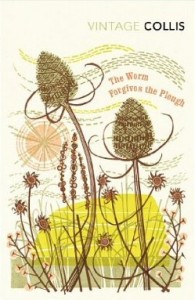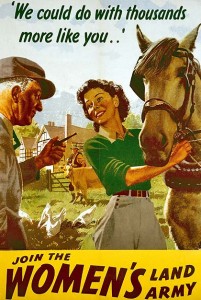
I promised myself I would only review books I really loved, that I would urge a close friend to read, sure they wouldn’t be disappointed. Few books pass this test.
John Stewart Collis was an educated man, born in Ireland in 1900, living and working in England. He wrote some biographies and pottered along quietly in the literary life. Then the Second World War came along. Wanting to work for his country, but too old to fight and not fancying a dull desk job, he volunteered for the Land Army. It consisted mainly of women, “Land Girls”, as thousands of farm labourers joined the armed forces.

Collis makes the long-gone era of scythes and horses immediately accessible. As a professional writer, he is from our modern urban world, familiar with politics, technology, change, middle-class angst. As a man experiencing the daily toil of following the plough or harrow, hoeing by hand, harvesting, pacing oneself while looking out for the owner’s car (a good moment to appear busy), he is in that rural world painted in such a golden light by the wartime posters.
And he’s funny. He notes that farm work is not an exhilarating form of exercise — he recommends a game of tennis for that; instead, you go at it steadily, never hurrying, whatever the weather. He is perfectly capable of writing wide-eyed descriptions, as when he kneels down beside an ancient tree-trunk and admires the insects hidden under the bark “building their Jerusalem in these countries of decay which must represent for them the acme of perfection”, the strange world of the fungi. But much more often he is direct, matter-of-fact: he likes to test the rotten wood with his boots.
Collis has the gift — I’d say it was rare — of noticing that the ordinary aspects of life and work all around him are strange and temporary. Here he is on what it is like trying to harness a farm horse by yourself:
When I came to harnessing for the first time I was surprised at the weight of the harness. I found that the breeching and attendant straps were as heavy as a saddle. When I tried putting the collar on I found I had put the bridle on first. Having taken off the bridle, the collar still wouldn’t go on — for the simple reason that you must reverse it while negotiating the head, which I had not done, thus following the example of Wordsworth who also failed in this matter. I was no more successful with the hames; I got them the wrong way round, and when at last I got them the right way round, I failed to pin them under the collar in a sufficiently tight notch. This done, I was now ready to put the horse into the cart. But I was not prepared for the difficulty of backing it straight between the shafts nor for the weight of the cart when lifted up by one of the shafts, nor for the difficulties confronting me in continuing the good work. For, having thrown over the long chain that rests on the breeching, and dodged under the horse’s neck to catch it on the other side, I missed it and it rolled back so that I had to throw it over again, all the time holding up the shaft with one hand while I went to the other side. And after this came the fixing of the remaining chains, all of which I put into the wrong notches.
I don’t know about you, but I’m sweating and powdered with stable dust just reading about it.
With the arrival of the first combine harvesters, which Collis admires, he perceives that the old way of life is going to be utterly disrupted, even while he and the other farm labourers continue to work on the farm, while the village pubs were still full of countrymen. It would be nostalgic, only the writing is quite unsentimental, and we are right there alongside Collis, looking up from our work as we watch the new machine as it roars and rattles along doing the work of twenty men, and reflect on what it will mean. This is something special. And I promise you’ll want to go out and buy a well-balanced axe and billhook, to try the pleasure for yourself.
Buy it from Amazon.com (commission paid)
Buy it from Amazon.co.uk (commission paid)
